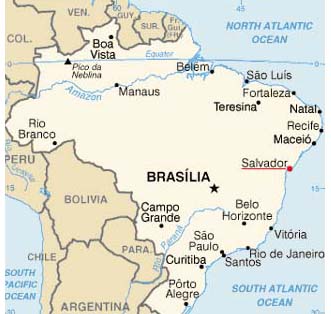 |
|
||||||||
|
Bahia Street: | ||
| From April through June, 2006, we will be supporting Bahia Street a non-profit girls school which seeks to end the cycle of poverty in the shantytowns of Salvador, Brazil. Here you can read about the urban slums of Brazil, Bahia Street's wonderful, and success stories from some of the girls they've helped. | ||
|
Favelas and the cycle of violence and poverty
For young women born into the favelas, the only choices of survival without education are prostitution or domestic service jobs which trap women in near-slavery conditions. In Brazil, maids are generally paid about $40 a month and are expected to live at the household of their employer. They do not enjoy the same standards of respect that we are accustomed to, and rape of maids is much too common. They are not allowed to take their children to work, and cannot afford other accommodations. The children are generally left alone in a room of a neighbor (where they are often abused, raped, and go hungry) or they live on the streets. Girls from the favelas often become pregnant at eleven or twelve. These children, trapped in a closed cycle, form the next generation of Brazil’s poor. Although there is a myth in Brazil of “racial democracy”, or racial equality, African-Brazilians are generally poorer, less healthy, and less educated than their white counterparts. Over 80% of Salvador’s three-million people are African-Brazilian, and nearly all live in shantytowns. 67% of African-Brazilian women work as domestic servants. African-Brazilians stay in school an average of two and a half years, with only 13.6% completing elementary school and only 2.1% completing high school. Of those who are able to attend school, they are 50% more likely than white Brazilians to leave without learning to read. Public schools are underfunded and dangerous. Teachers are poorly educated and poorly paid. Such schools do not teach students academic skills. Education is one of the only avenues out of misery for these people and, sadly, it is not available. Bahia Street aims to break this cycle for a handful of girls by providing the education, nutrition, emotional support, and encouragement that these girls need to attain a better life for themselves.
|
|
|
